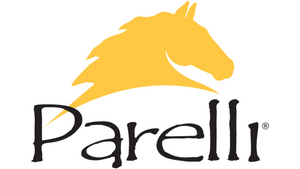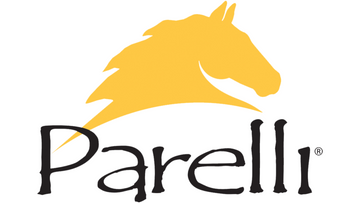How to Solve Horse Spooking Naturally
bis Parelli Natural Horsemanship auf Nov 09, 2022

By Juli Piovesan—4-Star Instructor & Director of Education
Pat Parelli has a saying – “the opposite of a spook is a yield.” That about sums up how to deal with horse spooking naturally. But, let’s be honest: the application of that saying can take a bit of work. I’d like to spend a few minutes here sharing some thoughts on how yielding helps improve spooking in horses.
Using the Seven Games to Help Prevent Horse Spooking
In the Parelli Program, we study what Pat calls the Seven Games. These games are forms of the dominance games that horses play with each other naturally in a herd (remember the horse that moves the other horse’s feet is the leader). All Seven Games can all be categorized into either a confidence building exercise or a yielding exercise. There are two different ways we yield our horses – we either use steady pressure or rhythmic pressure.
A good example of steady pressure is when a horse yields off of a rider’s leg. Rhythmic pressure, on the other hand, is when a horse yields to body energy or any form of rhythm made by a tool, let’s say for example the carrot stick and string. Both types of pressure help a horse understand where we’d like them physically to be (or not be) and where and how we’d like them to move.
You may activate your right leg to ask the horse to yield away from your leg and move into a different space – that’s the porcupine game using steady pressure. And you may swing your carrot stick and string very lightly at first and then a bit firmer using 4 phases of pressure until the horse leaves the space they were in and moves off at your desired gait – that’s driving game using rhythmic pressure.
Why Horse Spooks Happen
So now let’s go back to spooking – a spook is simply a horse deciding to act like a prey animal and fly from fear. This is very natural to a horse as their survival depends on their ability to out run a predator. But what’s natural to horses is often dangerous for humans.
In addition, a lot of times in human-ville, things that seem quite normal to us are the opposite of natural to a horse – hitting the road in a horse trailer seems like an exciting outing to the human but to the horse they are being shut in a metal cave on wheels that bounces down the road sometimes at 60 mph with all manner or alarming bumps, bangs, and clangs along the way!
Similarly, a nice hack out in the country or on a trail is the epitome of relaxation to many riders, but to our horses that is often an adrenaline filled jaunt where every corner reveals a new obstacle, shadow and potential life endangering situation. Your horse has no idea where you’re taking him or for how long, so when you walk a mile in his horseshoes you can see how even leaving the barn at times pushes him outside of his comfort zone and brings out the spook.
Bridging the Gap: Preventing Horse Spooking with Understanding
So how do we bridge this great divide between natural horse behavior and human goals and ambitions? Prior and proper preparation playing the Seven Games is the first step. Teaching yourself the Seven Games and then playing them with your horse - first on the ground and then riding - naturally positions you as the herd leader.
Remember how horses determine the herd leader? It’s the horse that moves the other horse’s feet. As you play the Seven Games, your horse begins to yield to you and also to make a mental and emotional shift about who’s who in the zoo. You step into a leadership role, and your horse is more likely to check in with you and synchronize with you mentally, emotionally and physically, just like he did with his mother when he was a little foal.
Are there still going to be situations that bring out the spook in some horses? Absolutely! When that happens, the first thing we need to do is cause the horse to yield. In the Parelli Program, we teach people how to use body blocks and communication at greater distances on the ground in order to stay safe. While riding, we prepare for the unthinkable using a technique called “controlled catastrophe”, and, we teach neutral lateral flexion so that we can bend a horse to a stop and control our horse’s feet at any time. We practice when the horse is calm and using the thinking side of his brain so that the request to bend becomes very natural and easy for them. We practice over and over for the human as well (first on the ground and then on the horse) so that we build muscle memory through repetition and consistency until the maneuver becomes second nature. This muscle memory will eventually kick in even at a subconscious level the moment a horse spooks which could help save your life one day!
If you don’t know them already, I encourage you to learn the Seven Games so that you can begin building your horse’s confidence and practice yielding your horse using steady and rhythmic pressure in preparation for when spooky situations come your way. You have the ability to be the herd leader and partner your horse always dreamed of so that you can stay safe, have fun, and achieve excellence, naturally!
Start learning the Seven Games today when you start your Levels Journey.







